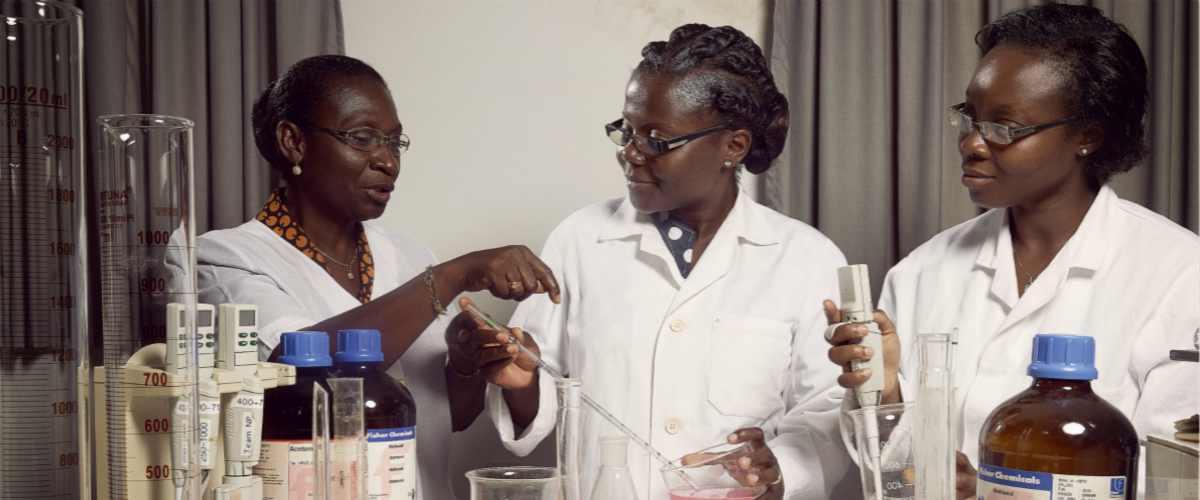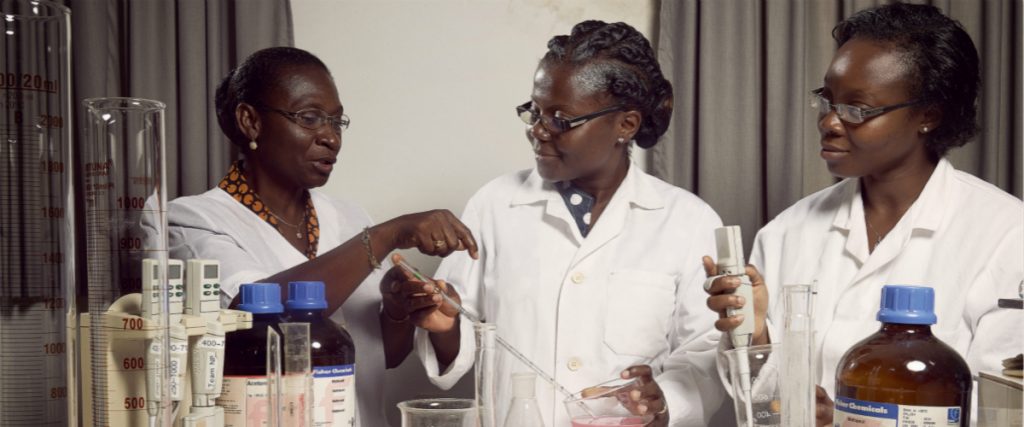Female scientists on the African continent face many hurdles which stall their progress in areas of research and development (R&D).
This has resulted in the worrying under-representation of women scientists in Africa, especially in Sub-Saharan Africa.
The World Health Organisation (WHO) states that in 2013, women researchers employed in R&D exceeded the global average in Central Asia (47 per cent), Latin America and the Caribbean (44 percent), Central and Eastern Europe (40 percent), Arab States (37 percent) and North America and Western Europe (32 percent) and Sub-Saharan Africa (30 percent),
The proportion of women researchers employed in R&D was much lower in South and West Asia (19 per cent) and East Asia and the Pacific (23 per cent).
If supported, women scientists have an important job to do in the development of the African continent. At the African Academy of Sciences Conference (AAS) recently held in Dakar Senegal, African women in science shared their experiences working in the areas of research and development.
Millicent Liani of Kenya is a Developing Excellence in Leadership, Training and Science (DELTAS) Africa Initiative learning research programme PhD fellow at the Liverpool School of Tropical Medicine (LSTM).
Part of her research looks at gender-equitable career paths within DELTAS programmes in Sub-Saharan Africa context in relation to an impediment to the career progression of women in scientific research.
Liani says women scientists face several complex intersecting issues that include individual, social-cultural and at institutional and policy level.
“Women in science have to create a work-life balance, meaning they have limited time to focus much on science.
“In the African context, women are expected to get married. In Sub-Saharan Africa, it’s in the mid-20s and 30s. At that time, the women are now developing their career into post-graduate studies and even the post-doctoral fellowship.
“During this time, there is pressure even from family and the community. There are negative stereotypes in terms of women who are prioritising their research careers over family,” Liani explains.
This, she says, becomes hard for the females.
“If married, some are torn in between. They finish their PhD and feel they have two balls to balance. Some feel they have a career which is like a rubber ball, which they can drop anytime and it can bounce back to them and progress with their career.
“Marriage and family becomes a glass ball. The women may think that if they drop it, it will break and they will lose everything. The balancing act really becomes a great challenge for these women.”
According to Liani, a woman has to struggle 10 times more than the men to break and move into the senior research and even scientific leadership position.
“Science calls for international scientific mobility and some women may have challenges of going into such gatherings where they can make networks and collaborations where they may get information about when to apply for the next grants.
“They may also miss out on networks in terms of collaborations and publications.
“As such, women tend to have weaker social capital compared to men,” she notes.
The time demands science leave women with limited time to move up and grow to what is defined as a standard scientific career.
“You have to publish, be visible out there in terms of communications of your science and also have to attract grants.
“Those grants are supporting your salary and research activity.
“In terms of time demands for that, women tend to be left behind. For instance, once you are done, you have to go back home. At work you switch on the work button, when you go back home you have to switch off that button and go to the home demand button,” she points out.
Within the DELTAS Africa programme, there has been equitable distribution of research grants between men and women.
“We are capitalising on that in terms of research training and providing career development training for them in terms of grant writing and support. Women are being paired with career mentors who know how to write grants and get the right collaborators to help uplift them.”
The mentors are both female and male and as Liani puts it, in science women need a career mentor and a psychosocial mentor.
“You need someone who listens and helps in terms of juggling the career issues, one who listens and helps in dealing with psychosocial and personal issues.

“These can be issues of work-life balance. How do you juggle that as a woman in terms of advancing in your career?”
African women face a number of challenges which require African solutions, especially in the areas of health. Such issues can be easily tackled by female scientists and researchers.
“Women have the potential. Just like men, women should come with innovative ideas to develop innovations that benefit the continent.
“What is holding us back is failure to handle the issue of power relations.”
Liani called for an increase in the numbers of women in science leadership. This she says will give a good picture to young emerging scientists.
“There is this perspective from younger scientists that most females who have made it have had to sacrifice their career or marriage.
“There is a need to increase the numbers of women. We are not understanding some of the social processes and drivers that bring inequities. From a policy perspective in science, there should be policies on childcare. This is in the form of better maternity and family leave policies and also when travelling.”
In 10 years’ time, she envisions women scientists taking research leadership positions.
Zimbabwean female scientist Zvifadzo Matsena Zingoni, who is currently pursuing doctoral studies at the Department of Epidemiology and Biostatistics, University of the Witwatersrand, South Africa is one female researcher who has seen it all.
She is under the DELTAS Africa Sub-Saharan Africa Consortium for Advanced Biostatistics (SSACAB) training programme.
Her research topic focuses on “Monitoring HIV disease progression among adults ART patients in Zimbabwe: Multi-state Markov Models” employing both frequentist and Bayesian models.
She says her research is critical in understanding the ART outcomes patterns after ART service decentralisation, transitions patterns of patients in the process of recovery, the spatial distribution of ART outcomes across the country and the cost-effectiveness of ART from the patient perspective.
According to Zingoni, female researchers need support as they face various challenges.
“I married soon after completing my master’s degree. Having that qualification was quite cool because I thought I had achieved something I thought many people could achieve.
“I always wanted to pursue my studies. While dating my now-husband Nathan Zingoni, we could joke on how much I wanted to do a PhD. When I got married, I thought I had achieved everything I wanted. I also did not want the other pressures that come with studying and pursuing my studies,” she reveals.
In the course of the journey, Zingoni says her husband supported and encouraged her to continue pursuing her dreams.
“If married, it will be good to have spousal support. In our African culture, there are challenges that come with the extended family and can pull women down. Having kids, the daughter-in-law roles one has to play makes it difficult to balance,” she explains.
To address the gender gaps in science research, women should be in the forefront.
“There are certain things we are scared to do, but we are capable of doing.
“Do we take that first step in certain things before the men come in front of us? Sometimes we may feel as if men are doing better, but if given equal chances, we can still pursue the same thing and women can do well,” she further explains.
Prisca Ndour of Senegal is a doctor of veterinary medicine with specialisation on epidemiology and risk assessment.
She is a fellow under Afrique One-ASPIRE Scientific Research Consortium.
Her research topic is on “Integrated regional approaches and use of new tools for rabies elimination in Africa.”
She says her objectives are to design development and field validation of a practical surveillance system and low-cost tools for both rapid and point-of-care diagnosis and an innovative vaccine storage system.
Looking back at her experiences, being a young female scientist is no stroll in the park.
“Being a female scientist involves a lot of sacrifices. When you are a woman, at some stage people will start asking when are you are going to get married and bear children etc. At the same time, men avoid dating women in science because they feel we have no time for them. It is hard,” says 38-year old Ndour, who is single.
She adds that to improve the numbers of women in science, men should be sensitised.
“Even if they are researchers, African men have difficulties understanding women scientists and researchers. I recently spoke to someone who had a PhD, but decided to discontinue studies because she wanted to get married. Her fiancé complained that she was always at the university, attending trainings, travelling for international events etc. Her fiancé told her to make a choice between him and her career. She chose him.
“Women in science are facing challenges. It’s rare to meet a woman happy with her work and at home. One of my colleagues is on her way to divorce,” she expounds.
Despite the challenges, Ndour enjoys her job.
“I like what I do and I enjoy it. It makes me happy. Since I was in high school, I was patient.”
Director of the Afrique One- ASPIRE consortium, Professor Bassirou Bonfoh, believes that no one should be excluded from a career in science research on the basis of academically irrelevant factors such as gender.
He said they encourage applications, especially from women and people with disabilities.
He said: “When I was a director of an institute, we got a grant and recruited both men and women. One month after signing the contract, a female fellow came to my office crying saying she is pregnant and wanted to know if I could keep her in the programme.
“She was surprised when I congratulated and told her that I was happy for her. She requested that we stop giving her stipend for nine months to one year so that she could continue when she returns. This meant her thesis would delay. We consulted with our board and extended the thesis for all women to four years.”
From paying for nannies for travelling breastfeeding female fellows as a way to ensure women do not miss out on important scientific meetings, Afrique One-ASPIRE seems to be doing well.
“We ask the women to tell us how they want us to assist them. This year I have four female fellows with new babies and we support them,” he adds.
Senegal’s Minister of Higher Education, Research & Innovation, Hon Cheikh Oumar Hanne, says they mainstreamed gender in science education and women were doing better than their male counterparts as the pass rates proved.

